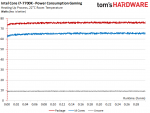I
imaginez
Gast
Krass. ^^ Ok, war mir nicht bekannt. Aber grade die Leistungsaufnahme ist auch ein Grund wieso ich nicht mehr übertakte. Es lohnt sich einfach meistens nicht.
Folge dem Video um zu sehen, wie unsere Website als Web-App auf dem Startbildschirm installiert werden kann.
Anmerkung: Diese Funktion ist in einigen Browsern möglicherweise nicht verfügbar.
nospherato schrieb:At idle the Intel Core i7-6900K Broadwell-E platform used 101W at idle and that is impressive as includes the ASUS X99 motherboard, NVIDIA GeForce GTX 1080 FE video card, Crucial MX300 1050GB SSD and the Corsair H105 water cooler. The processor topped out at 204W in Handbrake and 332W when playing Thief at 1080P.
(Was sagt uns das? Jeder misst, was er so will...)
imaginez schrieb:Angesichts der zu sehenden Kurve dürfte ein Ryzen 7 1800X bei 4.1 GHz dann schon 200 Watt (nur für den Prozessor) ziehen, bei 4.3 GHz dürften grob 250 Watt erreicht sein.[/B] Zumindest für Normalanwender wäre dies sicherlich keine Übertaktung, die man im Dauerbetrieb fährt – künftige Ryzen-Ausbaustufen müssen sich also auch dieses Problems annehmen, wenn AMD eines Tages mehr Takt bei Ryzen anbieten will."
Das finde ich schon ziemlich heftig.
It's only when all eight cores are fully utilized that the Core i7-6900K really gets going. For the first time in our review, we record a result greater than 200W. This has us curious where the flagship -6950X is going to end up.
At the risk of sounding like a broken record, the Core i7-6900K is reasonably efficient at its stock frequency. Overclock it, though, and this changes quickly and drastically. Every 100MHz step up comes at the cost of a hefty core voltage increase. And it can’t be overclocked beyond 4.3GHz at all, no matter how much voltage you add.
kisser schrieb:Das sagt uns, dass hier das komplette System bei Thief 332 Watt zieht, also inklusive Board, Grafikkarte etc....
imaginez schrieb:Also bei mir frisst die CPU mit 4.4 Ghz in Cinebench 81 Watt maximal.

